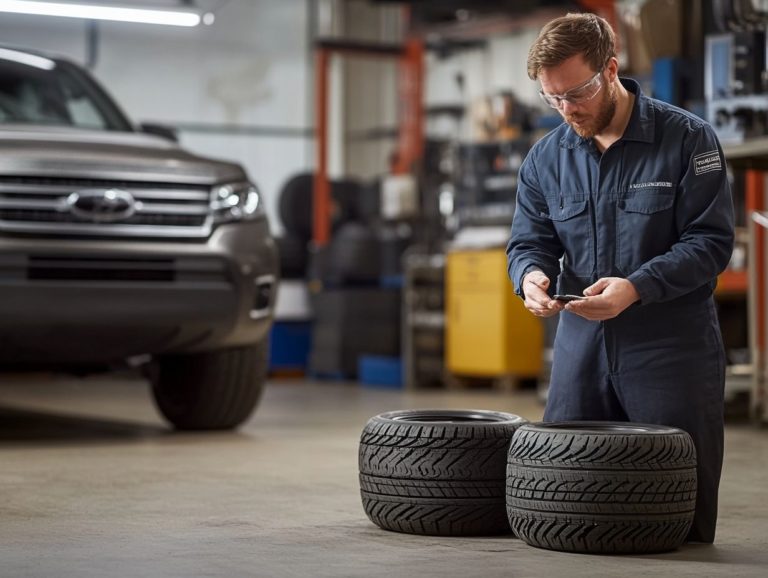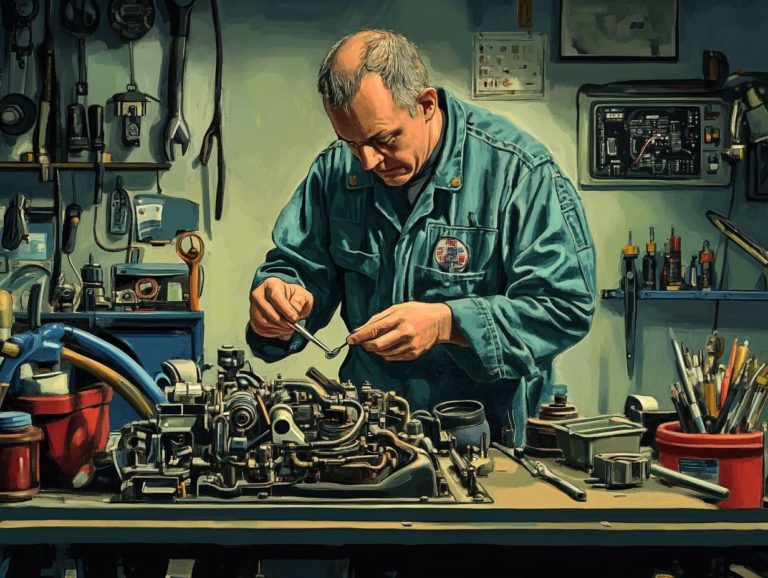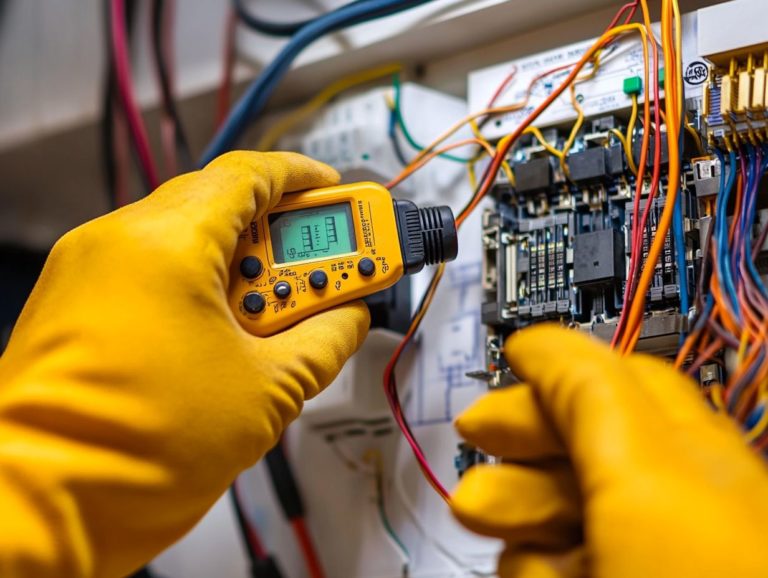How Important Is It to Change Your Air Filter?
Air filters are essential for ensuring a clean and healthy indoor environment.
Whether your goal is to enhance air quality, boost energy efficiency, or extend the life of your HVAC (Heating, Ventilation, and Air Conditioning) system, understanding air filters is important. This article explores the different types of air filters, highlights the importance of regular changes, and offers effective methods for doing so.
You will discover how to choose the right filter and maintain it for peak performance. Don t wait; make sure to check your air filter now to cultivate a healthier home!
Contents
- Key Takeaways:
- Understanding Air Filters
- The Importance of Changing Your Air Filter
- When to Change Your Air Filter
- How to Change Your Air Filter
- Choosing the Right Air Filter
- Tips for Maintaining Your Air Filter
- Frequently Asked Questions
- How often should I change my air filter?
- What happens if I don’t change my air filter?
- Can I change my air filter myself?
- Will changing my air filter save me money?
- Do all air filters need to be changed?
Key Takeaways:
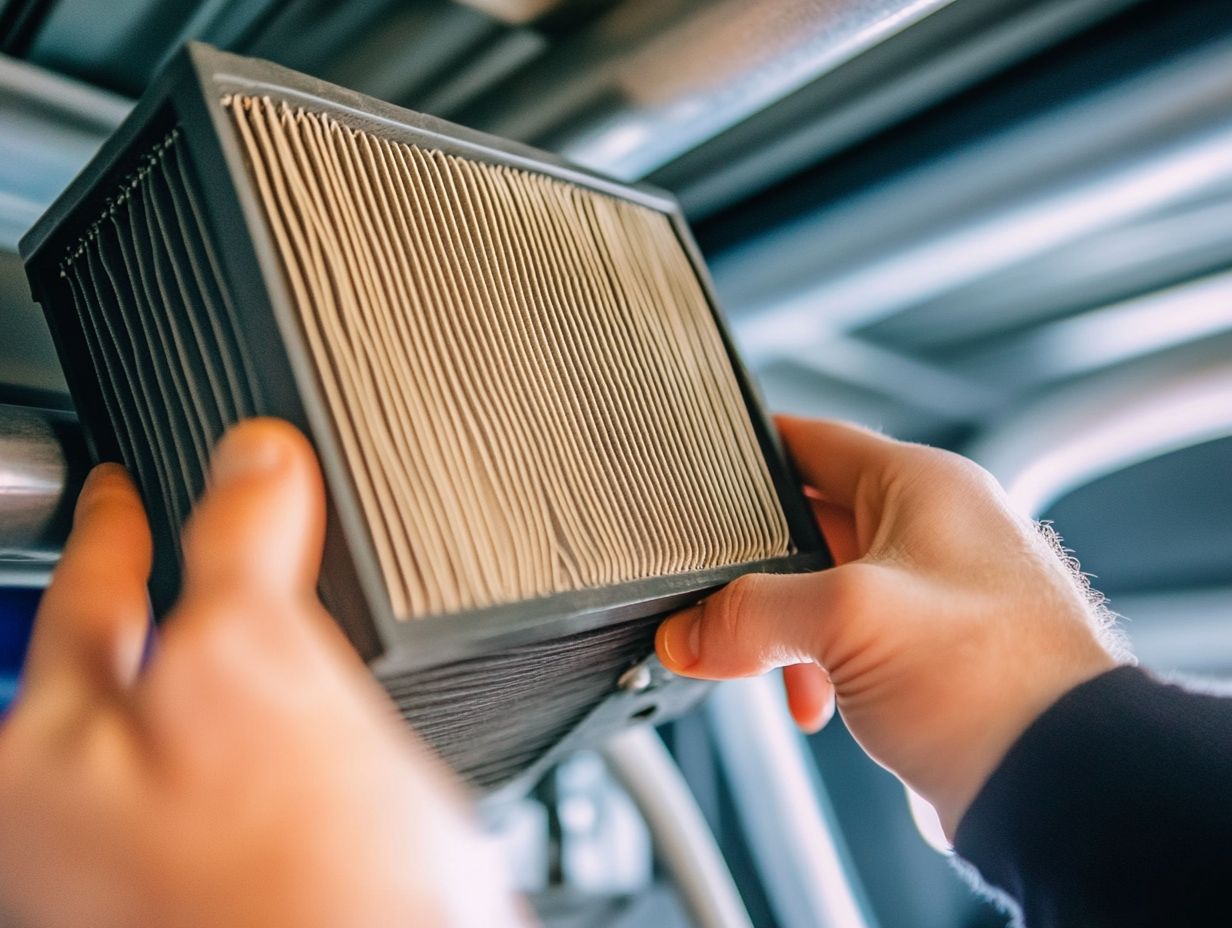
- Regularly changing your air filter is crucial for maintaining good indoor air quality.
- Dirty air filters can restrict airflow, increasing energy costs and health risks.
- Consider household size, pets, and allergies to determine how often to change your air filter.
Understanding Air Filters
Understanding air filters is important for improving your living environment and optimizing the performance of your HVAC system. These devices play a key role in enhancing indoor air quality by effectively capturing dust, allergens, and pollutants that can impact your health and comfort at home.
By keeping up with your air filter maintenance, you ensure improved airflow and boost energy efficiency, which can lead to lower energy bills. Regular inspections and a good understanding of the various filter types available will help you choose the ideal solutions tailored to your needs.
What is an Air Filter?
An air filter is a vital device designed to remove contaminants from the air in your home, significantly enhancing your indoor air quality.
By capturing a variety of pollutants such as dust, pollen, pet dander, mold spores, and even airborne bacteria, air filters play a crucial role in creating a healthier living environment. The effectiveness of these filters varies, with options like HEPA filters that trap an impressive 99.97% of particles as small as 0.3 microns and activated carbon filters that excel at absorbing odors and volatile organic compounds.
Regular maintenance of your air filters is essential; neglecting to change or clean them can reduce airflow and compromise your overall air quality. By ensuring that your air filters are well-maintained, you extend their lifespan and safeguard the health and well-being of everyone in your home.
Types of Air Filters
You ll find various air filters available, each crafted to meet specific needs, including HEPA filters, fiberglass filters, and pleated filters. Understanding these differences can greatly enhance your indoor air quality.
HEPA filters are renowned for their remarkable efficiency, capable of trapping up to 99.97% of particles as small as 0.3 microns. This makes them an excellent choice for anyone suffering from allergies. In contrast, fiberglass filters are budget-friendly but primarily target larger particles like dust and lint, falling short in capturing smaller pollutants. If you want a balance, pleated filters offer decent filtration while remaining cost-effective; however, they require more frequent replacements to perform at their best.
By evaluating the costs and pollutant removal effectiveness of each option, you can make informed decisions that align perfectly with your unique circumstances.
The Importance of Changing Your Air Filter
Changing your air filter regularly is crucial for optimizing your HVAC system’s performance and ensuring the air in your home remains pristine. For more information on this topic, check out the importance of cabin air filter maintenance. A dirty air filter can lead to various health issues, from respiratory conditions to allergies, due to the buildup of dust, allergens, and pollutants in the air.
Failing to replace your air filter will severely restrict airflow and energy efficiency, resulting in higher energy bills and the risk of HVAC system failure. By committing to regular filter replacements, you improve the longevity of your system and cultivate a cleaner, healthier living environment.
Effects of a Dirty Air Filter
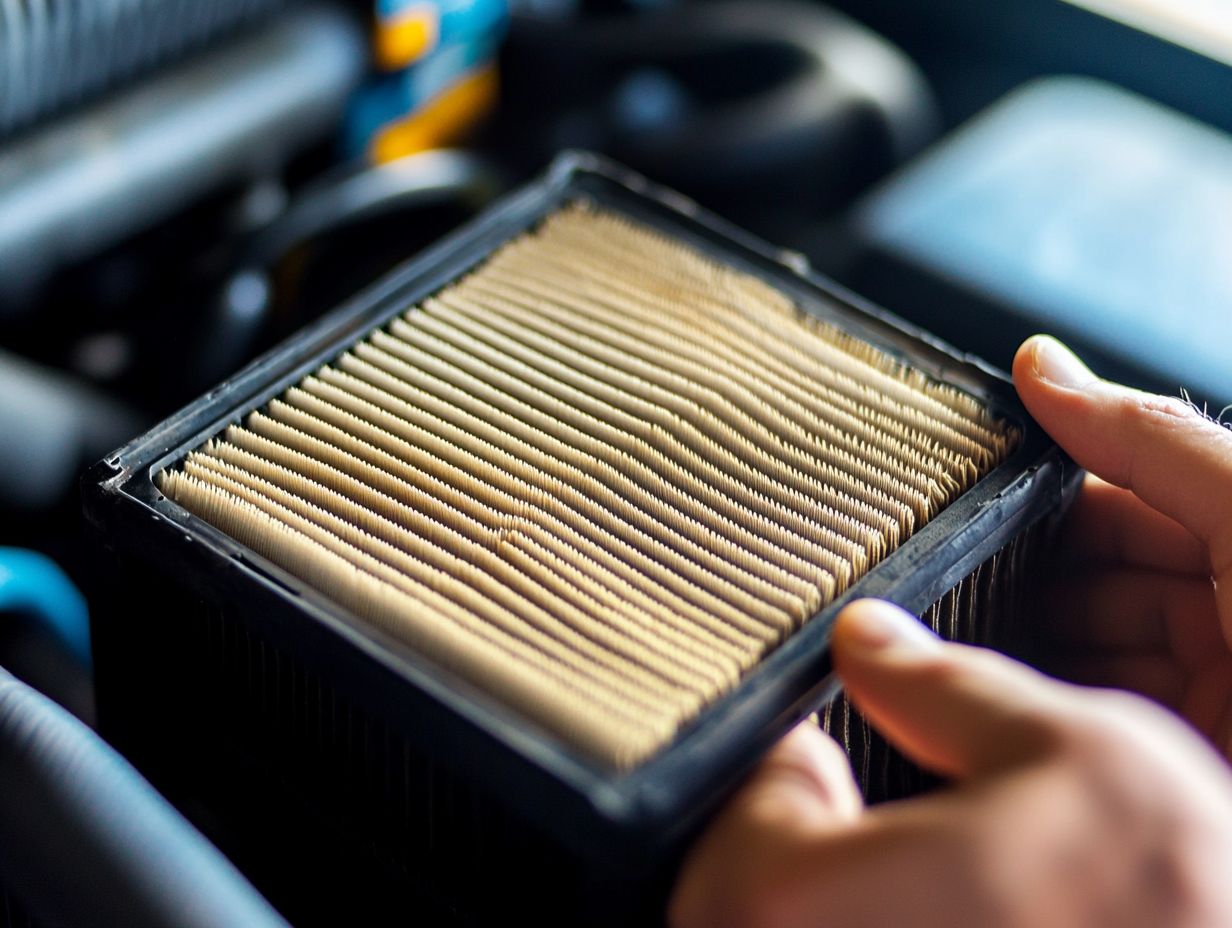
A dirty air filter can compromise your home’s air quality and HVAC efficiency. This situation can lead to health issues and higher energy bills.
When the filter clogs, it restricts airflow. This makes your system work harder, consuming more energy and driving up utility costs.
Poor air quality can worsen asthma and allergy symptoms. Respiratory discomfort may arise for those sensitive to airborne pollutants.
Common allergens like dust mites and pollen linger longer in the air. They can aggravate those with existing conditions.
By keeping your air filter clean, you boost energy savings and foster a healthier home. This ultimately promotes better respiratory health for you and your loved ones.
Benefits of Regularly Changing Your Air Filter
Regularly replacing your air filter offers many benefits. You get improved air quality and enhanced energy efficiency.
A clean air filter dramatically cuts down on dust and allergens in your home. This creates a healthier living space for everyone.
With a clean filter, your HVAC system runs more efficiently. This results in lower energy bills and who doesn t love that!?
Track your filter changes to enjoy optimal system performance. This helps minimize both repair frequency and costs.
When to Change Your Air Filter
Knowing when to change your air filter is crucial. This helps maintain superior indoor air quality and keeps your HVAC system running efficiently.
The frequency of changes depends on several factors. Consider your household size, the presence of pets, and local environmental conditions.
As a general rule, inspect your filter every month. Aim to replace it at least every three months.
Some situations may require more frequent changes. Being aware of your circumstances helps you enjoy better health benefits and energy savings.
Factors to Consider
Several factors influence how often you should change your air filter. These include the number of pets in your home and seasonal changes affecting air quality.
Your indoor activities also matter. Cooking, burning candles, or playing music can stir up dust and impact your filter performance.
The surrounding climate is also important. In humid areas, mold thrives, making filter maintenance essential.
If you live near busy roads or industries, dust and pollutants can degrade your filter faster. Regularly checking these factors is key to a healthy living space.
How to Change Your Air Filter
Changing your air filter is a simple yet impactful task. It greatly improves your HVAC system’s efficiency and indoor air quality.
First, confirm you have the right filter size and type for your HVAC system. Using the wrong filter can disrupt airflow and impact filtration.
Follow a clear step-by-step guide to navigate the installation process easily. This ensures a cleaner and healthier home environment.
Step-by-Step Guide
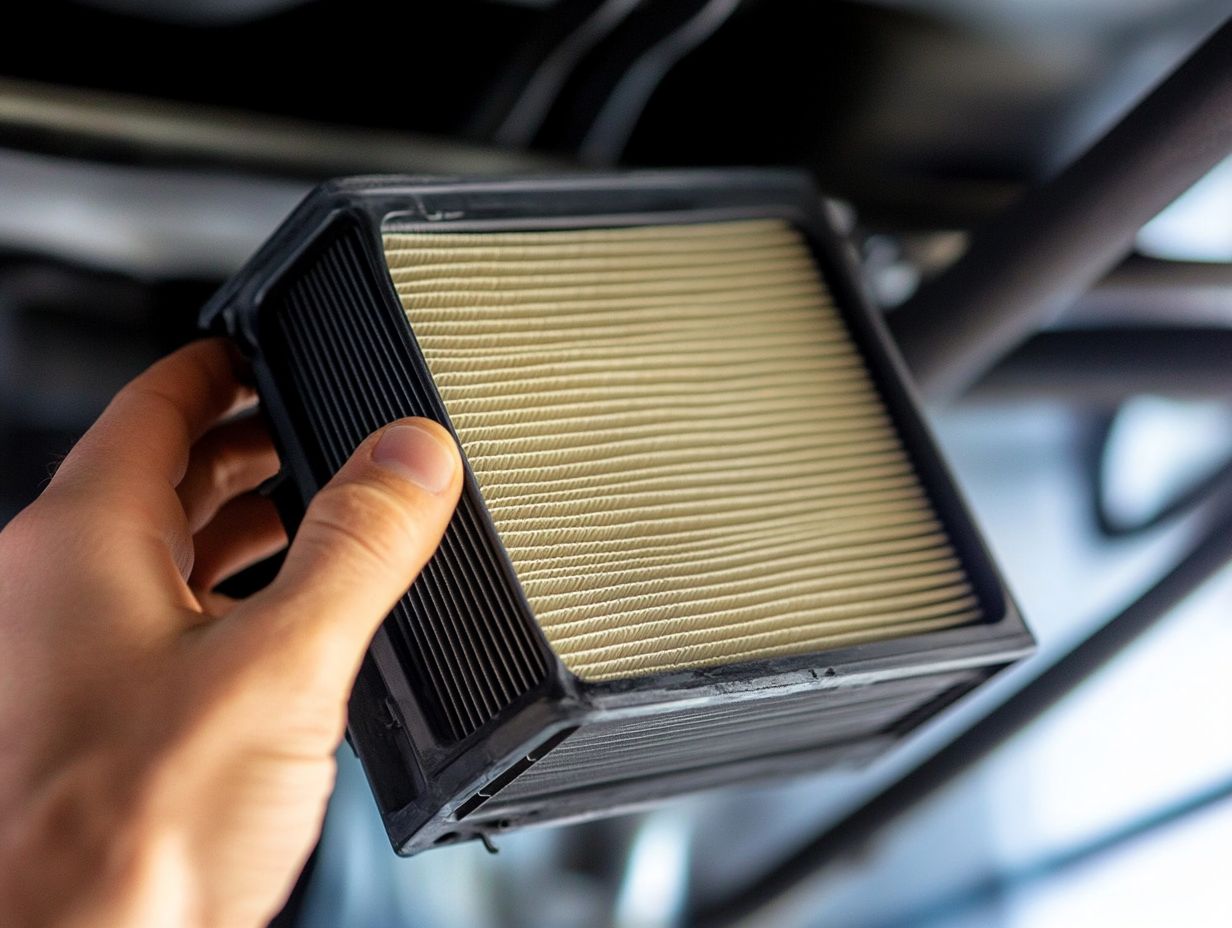
To effectively change your air filter, follow this step-by-step guide for proper installation and optimal performance. This straightforward process helps maintain air quality in your home and boosts the efficiency of your HVAC (Heating, Ventilation, and Air Conditioning) systems.
Start by turning off the power to your HVAC unit for safety. This prevents any accidental operation during the filter change. Next, locate the filter compartment, which can vary in placement depending on your system type. Carefully remove the old filter and note any signs of wear or dirt. This will give you insight into when it s time for the next replacement.
Consider marking your calendar with the change date and setting reminders for future replacements. This proactive approach ensures clean air and optimal circulation throughout the year. Investing just a few minutes can save you big bucks on your energy bills!
Choosing the Right Air Filter
Selecting the right air filter is essential for achieving the finest air quality and ensuring your HVAC system operates at peak efficiency.
Various filter types such as HEPA filters, fiberglass filters, and pleated filters differ significantly in effectiveness and lifespan. By understanding your specific needs and determining the appropriate filter size for your system, you can make informed choices that enhance indoor air quality while considering your environmental impact.
Factors to Consider
When selecting the right air filter, it’s crucial to consider key factors: the types of filters available, the size that fits your HVAC system, and your household’s unique air quality needs.
Assessing individual health concerns is important, especially if anyone in your home suffers from allergies or respiratory issues. These conditions can greatly influence your filter choice. If you have pets, consider filters designed to capture fine particles, as pet dander can worsen allergies.
Environmental factors also play a role. If you live in an area prone to air pollution or wildfires, this will affect your filter decision. By evaluating these elements, you ll be better equipped to make an informed choice, ensuring a healthier indoor atmosphere for everyone in your home.
Tips for Maintaining Your Air Filter
Maintaining your air filter is vital for peak efficiency, enhancing indoor air quality and energy efficiency. Regular cleaning and timely replacements keep your HVAC system running smoothly and lower your energy bills.
By following straightforward maintenance tasks, such as inspecting the filter and adhering to a replacement schedule, you can create a cleaner and healthier home environment.
Cleaning and Replacing Tips
To keep your air filters working effectively, regular cleaning and replacement are essential. Neglecting these tasks can decrease indoor air quality, affecting your health and comfort.
Regular maintenance fosters a healthier living environment and boosts energy efficiency. A clean filter allows your heating and cooling systems to operate more smoothly.
It s wise to clean reusable filters every month and replace them at least every six months, or as needed. This practice guarantees optimal performance and extends the lifespan of your HVAC system, ultimately saving you money on energy bills.
Remember, maintaining your filters goes beyond just air cleanliness; it’s a proactive step toward enhancing your overall home wellness.
Frequently Asked Questions
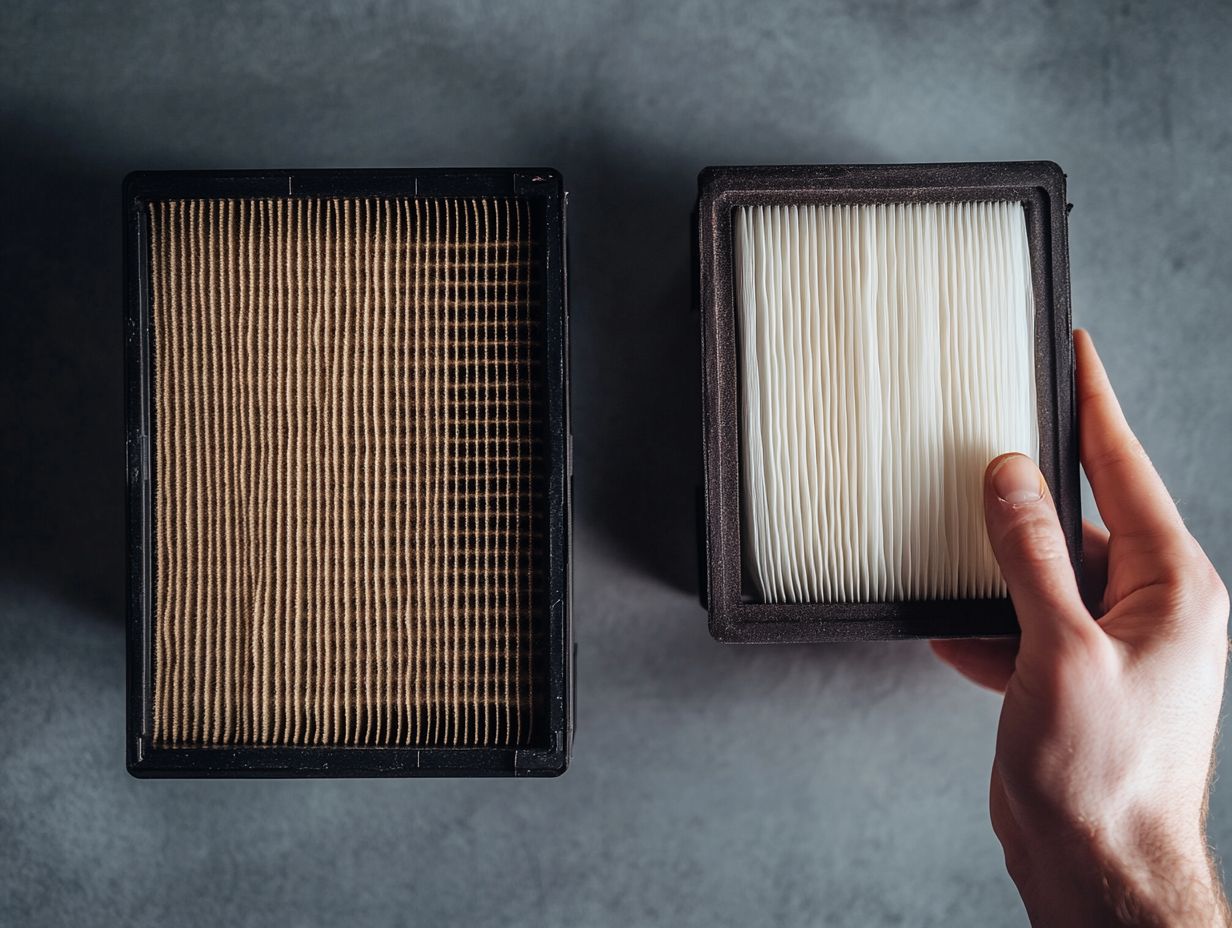
How important is it to change your air filter?
It is extremely important to change your air filter regularly. This helps maintain the air quality in your home and, as highlighted in the importance of regular filter changes, keeps your HVAC system running efficiently.
How often should I change my air filter?
It s recommended to change your air filter every 1 to 3 months, depending on usage and type of filter.
What happens if I don t change my air filter?
Neglecting to change your air filter can lead to reduced air quality and strain your HVAC system, causing higher energy bills and potential repairs.
Don t wait! Change your filter today for cleaner air tomorrow!
How often should I change my air filter?
Change your air filter every three months to keep your air fresh! If you have pets or allergies, consider changing it more often.
What happens if I don’t change my air filter?
Not changing your air filter allows dirt, dust, and allergens to build up. This clogs your air and can damage your heating, ventilation, and air conditioning (HVAC) system!
Can I change my air filter myself?
Absolutely! Changing your air filter is a simple task that most homeowners can handle.
If you’re uncomfortable, hiring a professional is always an option.
Will changing my air filter save me money?
Yes! Regularly changing your air filter improves your HVAC system’s efficiency.
This means lower energy costs and fewer repairs!
Do all air filters need to be changed?
Yes, all air filters need to be replaced eventually. Some last longer than others, so follow the recommended schedule for your specific filter.



